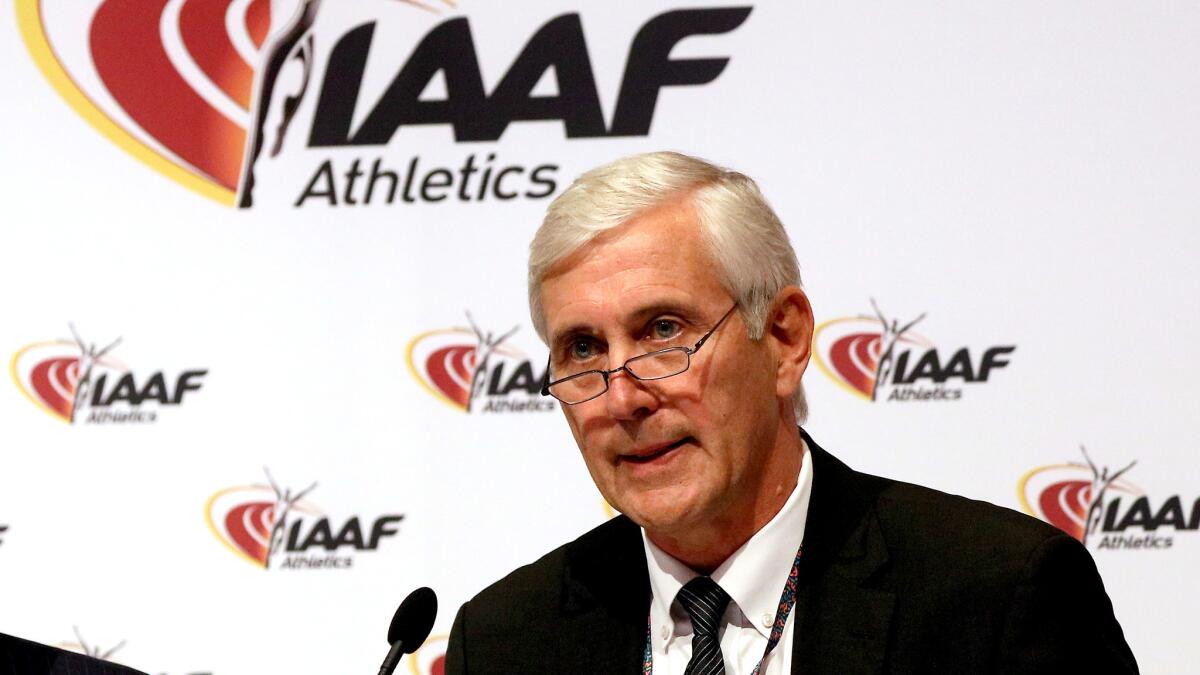IAAF upholds ban of Russian track athletes from Rio Olympics

There was a hint of defiance among international track officials as they announced a landmark decision to ban Russiaâs powerful track team from the 2016 Summer Olympics in Rio de Janeiro.
With their sport hit by a raft of doping and corruptions scandals in recent months, the leaders of the IAAF, the international governing body for track and field, said they were trying to send âa very, very powerful message.â
It came in the form of a unanimous vote at a special meeting in Vienna on Friday, alleging that Russia was still clinging to a system of cheating that dated back to the former Soviet Union.
âThe head coach of the the Russian [track] team and many of the athletes on the team appear unwilling to acknowledge the nature and extent of the doping problem,â said Rune Andersen, leader of an IAAF task force. âAnd certain coaches and athletes appear willing to ignore the doping rules.â
Russian President Vladimir V. Putin immediately condemned the ruling as âunfair.â Sports officials in his country had fought for reinstatement, instituting a series of reforms after their team was initially suspended from international competition last year.
âWe have done everything possible since the ban was first imposed to regain the trust of the international community,â said Vitaly Mutko, the nationâs sports minister. âWe have nothing to hide and feel we had met the IAAFâs conditions for re-entry.â
Mutko hinted that he may now turn to the International Olympic Committee, which has final say on the Games. There is also the possibility of a legal challenge and questions about a loophole that could allow some Russians on the track at the Games this summer.
âThis might not be the end of this issue,â said Roger Pielke Jr. of the Sports Governance Center at the University of Colorado. âIt might just be the beginning of the end.â
Officials of the International Assn. of Athletics Federations acknowledged the threat of a lawsuit prompted them to include a process by which Russian athletes who can âclearly and convincinglyâ prove they are clean may apply to compete in Rio as âneutralâ athletes under the Olympic flag.
Andersen called it a âvery tiny crack in the door.â
âBecause the system in Russia has been tainted from the top level and down,â he said, âwe cannot trust that what we call and what people might call clean athletes really are clean.â
Uncertainty surrounding the process left unclear how much Fridayâs decision will affect the upcoming Summer Games.
If dozens of Russian athletes are ultimately allowed to compete, Rio will look âmuch the sameâ as other Olympics, Pielke said. But that wonât be the case if the suspension holds for the vast majority of the team.
Russians won 18 medals in track and field at the 2012 London Olympics. They took gold in the menâs 110-meter hurdles and womenâs high jump at the most recent world championships.
Just as significant, Russia still ranks as a traditional rival to the U.S.
âIf only a few of them compete, then it becomes noticeable,â Pielke said. âThen it becomes part of the narrative of these Games.â
The move to ban an entire team is not new â all Bulgarian wrestlers were barred from Rio by their international federation after a slew of positive doping tests last spring.
Nations have been excluded too, but only for geopolitical reasons. The IOC banned South Africa for refusing to condemn apartheid and Afghanistan for discriminating against women under the Taliban regime.
For decades, the Soviet Union faced allegations of systemic doping, particularly in regard to East German athletes. Andersen said that Mutko recently âadmitted that they have inherited a doping culture.â
The current scandal originated with a World Anti-Doping Agency report last November that presented evidence of widespread cheating and suspicions of involvement by government officials.
After initial denials, Russian sports leaders overhauled their track federationâs leadership, offered to conduct additional drug tests and allowed international experts to observe their anti-doping agency.
But a subsequent WADA report, issued earlier this week, alleged that drug testers continued to face resistance.
One Russian athlete was seen running from the stadium immediately after competing, the report said. Another was caught using a hidden container that authorities believe held clean urine. When the substitute urine leaked, she allegedly tried to bribe the tester.
As the IAAF vote drew near, Mutko complained Russia was being singled out among other nations, such as Kenya and Ethiopia, that had come under suspicion. He claimed that if the ban were upheld, it would unfairly punish athletes who had never tested positive.
That argument ultimately failed to sway track officials, who have recently faced controversies of their own, including a corruption investigation of former leader Lamine Diack and criticisms surrounding current President Sebastian Coe.
Within hours of the decision, Olympic leaders announced that they will hold a teleconference on Saturday to âdiscuss the appropriate next steps.â
The IOCâs executive board has also scheduled a meeting for Tuesday in Lausanne, Switzerland, to discuss issues of eligibility and âthe difficult decision between collective and individual responsibilities.â
MORE ON RIO OLYMPICS
âGrandma IaiĂ â becomes oldest Olympic torchbearer
Donât worry. Rio Games have problems, but so have other Olympics
âClean Russian athletesâ appeal to IOC ahead of the 2016 Summer Olympics
More to Read
Go beyond the scoreboard
Get the latest on L.A.'s teams in the daily Sports Report newsletter.
You may occasionally receive promotional content from the Los Angeles Times.











